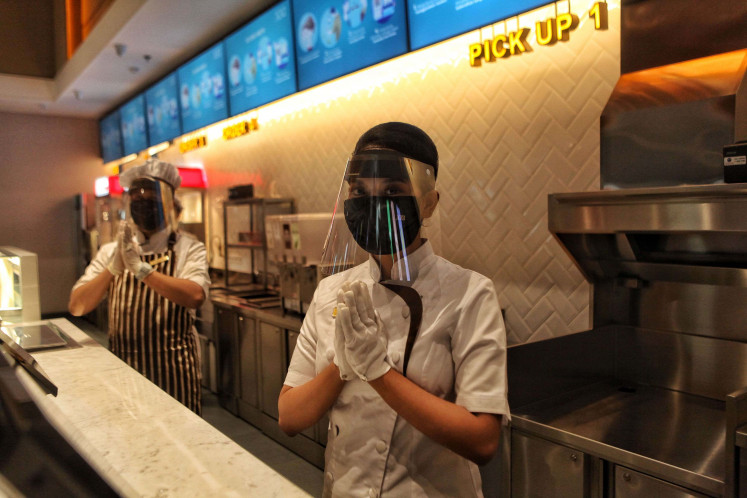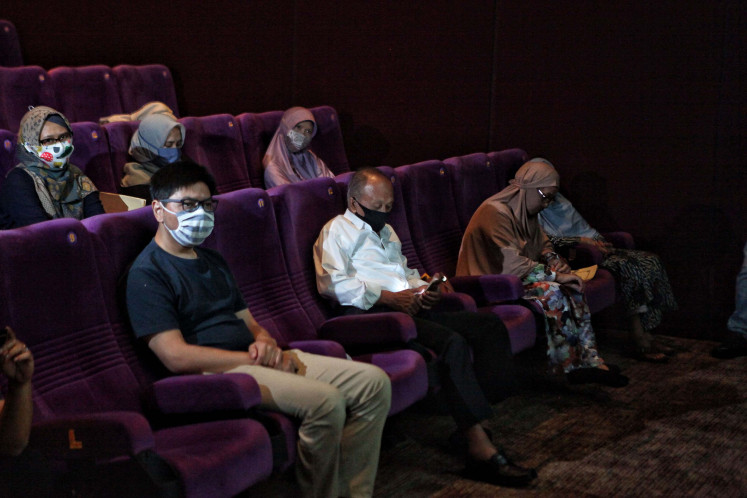Popular Reads
Top Results
Can't find what you're looking for?
View all search resultsPopular Reads
Top Results
Can't find what you're looking for?
View all search resultsPopcorn and pandemics: Moviegoing during COVID-19
Following the initial closures on March 23, theaters across Jakarta were to reopen on July 29, but the rising number of infections halted those plans.
Change text size
Gift Premium Articles
to Anyone
W
eekly activities that were once routine for many, like simply standing in line to purchase a ticket for the latest movie releases at your favorite theater, have been missed during the pandemic.
With movie theaters still closed across the country, many would-be filmgoers have shifted online, where streaming services like Netflix and its ilk are enjoying the limelight for the foreseeable future.
As such, the film industry has taken steps to adjust, with production house MD Pictures stepping up to release its latest titles online.
According to a statement obtained by The Jakarta Post, the production house had resumed filming and production in July, with five titles premiering online this month.
Cinema staff wear face shields and masks during a simulation of the reopening of XXI Cinema in Jakarta on Aug. 29. (JP/Seto Wardhana)The drama Bidadari Mencari Sayap (Angel Seeking Wings) by Aria Kusumadewa premiered on Disney’s platform Disney+Hotstar on Oct. 2, followed by Arie Kriting’s Pelukis Hantu (Ghost Painter) on Oct. 16.
Sejuta Sayang Untuknya (A Million Love for Them) starring Deddy Mizwar and Syifa Hadju will be released on Oct. 23, to be closed with Rudi Soedjarwo’s Denting Kematian on Oct. 30.
Meanwhile, the Rizal Mantovani-directed horror short Malapataka (Catastrophe) will also premiere exclusively on WeTV and iflix.
MD Pictures president director Manoj Punjabi said in the statement that as the largest production house in Indonesia, there was a responsibility to continue creating even in a pandemic.
“The main focus of MD Pictures is to release films in theaters but we also spread our wings through OTT [over-the-top] platforms for viewers at home. We have prepared a launch schedule of films and series through several OTT platforms with the same attention to detail as to our focus on theater openings,” he said.
Indonesia, where cases have shot past the 300,000 mark and with the highest death toll in Southeast Asia of over 11,000, is keen on rejuvenating the economy by gradually reopening businesses and holding events – with the magic words being “following health protocols”.
However, as COVID-19 still ravages the nation, many plans have been scrapped due to the ongoing situation.
Indonesia’s film industry has been hit particularly hard by the pandemic. Along with the cancellation of numerous projects due to strict large-scale social restrictions (PSBB), theaters have been shut since late March, with no clear date on reopening.
Capital city Jakarta, with the largest number of positive cases in the country, is keen on reopening cinemas. However, plans fell through both times.
Following the initial closures on March 23, theaters across Jakarta were to reopen on July 29, but the rising number of infections halted those plans.
Still, the industry is anxious to get back on its feet, with the Jakarta administration in talks to reopen theaters. Even the national COVID-19 task force got in on the act, with its spokesperson Wiku Adisasmito saying that movie theaters were an important contribution to public life as happiness could increase immunity.
But as cases continue to rise across the country and Jakarta reimposed PSBB on Monday, reopening theaters remains a controversial and polarizing policy.
In a discussion hosted by the Jakarta Arts Council, member of the Governor’s Team for Accelerated Development (TGUPP) Dedi Wijaya explained that the decision to reopen theaters was meant to help reactivate the economy.
“We’ve seen discussions in the United Kingdom, for example, where theatres on the West End [of London] would face permanent closures if not for government intervention. We’ve realized that, and in the months of transitional PSBB since June, we focused our discussions on sectors that would eventually have to return, such as shopping centers and MSMEs,” he said.
As for the cinemas, Dedi noted that discussions with industry players had been ongoing since June, with many of the points based on the CinemaSafe program by the United States’ National Association of Theatre Owners.
“There are several studies showing that, counterintuitively, cinemas have a relatively lower risk of infection [compared to other buildings]. Once again, this is all arguable, but this is what we can gather from CinemaSafe.”
Standard procedures for the reopening include the mandatory wearing of masks, an air filtration system to speed up circulation, along with regularly scheduled cleaning and disinfecting. Modifying ticketing transactions along with food and beverage consumption is also on the list, as is the expected social distancing measures and screening of symptoms for both guests and employees.
Dedi also highlighted the need for a positive perception of the industry, as demand will simply dry up and the economy will stagnate if they do not feel safe.
“Businesses considered to be in the secondary and tertiary needs like cinemas will require a longer period for adjustments, so we are also working closely with the National Disaster Mitigation Agency, which has given its blessing,” he said, adding that businesses must submit a proposal to be considered and reviewed by the administration.
Linda Gozali, secretary-general of the Association of Indonesian Film Producers (APROFI), said the national film industry hasd been on the rise prior to the pandemic, while films with the potential to reach the 1 million viewer mark had been deeply affected by theater closures.
“Of course, we have to abide by the ongoing developments, as we don’t want to jeopardize lives,” she said.
Linda also proposed a tracing model for prospective cinemagoers, where an app would ask health-related questions such as antigen test results or physical condition on the day of the show prior to purchasing tickets. These questions, she continues, will provide some measure of responsibility to cinemagoers, and those who do not provide adequate answers may be denied purchase.
However, not everyone agrees with a proposed reopening if done in current conditions.
Sigit Pramono, head of the non-profit group Gerakan Pakai Masker (Mask Wearing Movement), points out the reluctance or unwillingness of some people to wear masks even after numerous programs and educational efforts, which will increase risks when holding events or activities that draw crowds.
“We think that this should not be rushed, as we also have to remember the emerging clusters in office buildings and factories as well as – despite the studies – the difference between Indonesian theaters with their international counterparts,” he said.
Sigit is of the opinion that if the reopening of theaters is to rejuvenate the country’s battered creative economy, it is not a strong enough reason as every sector of the economy has felt the pandemic’s impact.
“I myself own a hotel, and we have had zero guests over the past six months. I am also one of the initiators for the music event Jazz Gunung [Mountain Jazz] and we have also been deeply affected [...] There should be another reason why cinemas must reopen, and if it is to make people happy, then they could increase the number of drive-in cinemas,” said the former banker.
Hikmat Darmawan, film critic and member of the Jakarta Arts Council’s film committee, highlighted the importance of context when basing decisions on theaters that have already opened in other countries.
“We then focus on that theater’s health protocols, leaving out the main context of the reopening, which is the number of cases. This can vary wildly between countries depending on the curve.
“China, for example, has been on lockdown since January with its epicenter in Wuhan. They also invested heavily in digital theaters. With that context, the decision to reopen is on a city-by-city basis, as they also have a more equal distribution of theater infrastructure, he explained, noting Indonesian theatres’ heavy concentration in Greater Jakarta.
With Jakarta having the concentration of screens in the nation and being the epicenter of the pandemic, Hikmat pointed out the scale of the industry’s issue.
“What we need is a clear quantitative parameter – at what point can we say that it is safe? Is it when the curve has flattened for several days in a row, or whether cases have gone down? This is where the matrix between health and the economy comes together.”













